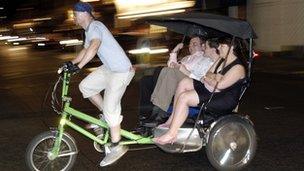London rickshaws may be licensed if plans are approved
- Published

Parts of the current law date back to 1831
Bicycle rickshaws, motorcycle taxis and stretch limousines could be licensed as part of plans to improve road safety.
<link> <caption>Under the proposals</caption> <altText>Consultation on taxis and private hire services</altText> <url href="http://lawcommission.justice.gov.uk/consultations/1804.htm" platform="highweb"/> </link> set out by the Law Commission for England and Wales, a "peak time" taxi licence could also be brought in.
A national minimum of safety standards was also recommended by the commission.
Taxi numbers would no longer be restricted by local authorities and private hire operators would be able to take bookings outside their local area.
If passed, the reforms would ensure that volunteers who drive elderly people or childminders who collect children as part of their work would no longer be at risk of being caught by licensing rules.
There would also be exemptions from licensing for wedding and funeral cars, said the commission which reviews and recommends law reforms.
With the introduction of national minimum standards, there would be no scope for additional local requirements such as local knowledge or specific vehicle standards for mini-cabs, but these would remain in place for taxis which can be hailed on the street.
'Quite a danger'
Frances Patterson QC, the commissioner responsible for the review, said the proposals would "streamline and improve taxi and private-hire legislation".
The law on taxis and private-hire vehicles is "fragmented, complex, and out of touch with 21st Century life", the consultation document said.
It comes after peers called for the licensing of pedicabs last October, to prevent them from becoming a hazard for other road users.
Tory Baroness Gardner complained that the pedal-powered tricycles, which can take up to three passengers, sometimes "cut right across traffic" in London.
She said they posed "quite a danger" which proper regulation could tackle.
The commission reviewed the current law, some of which dates to 1831, and the consultation on its proposals will run to August.
- Published20 December 2011